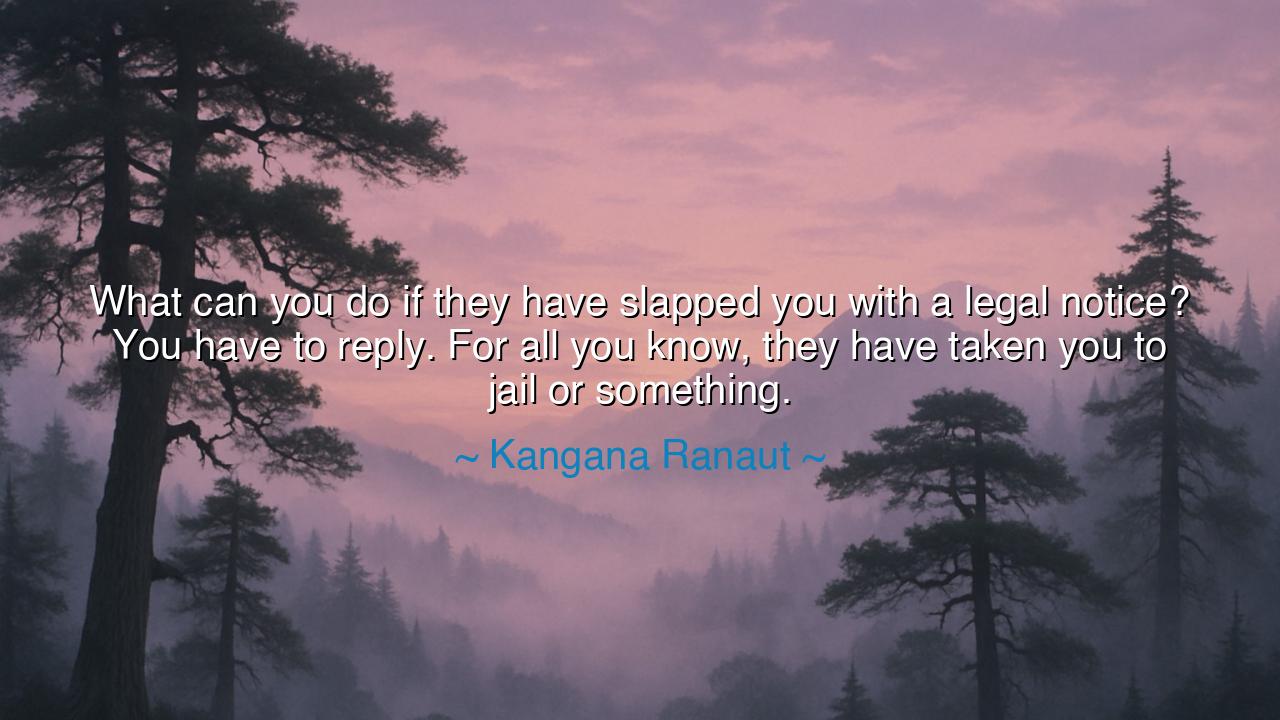
What can you do if they have slapped you with a legal notice? You
What can you do if they have slapped you with a legal notice? You have to reply. For all you know, they have taken you to jail or something.






In the chronicles of human society, there exists a moment of confrontation that tests both courage and wisdom: the receipt of a summons, a declaration, a challenge from the powers that govern. Kangana Ranaut’s words, “What can you do if they have slapped you with a legal notice? You have to reply. For all you know, they have taken you to jail or something,” resonate with the ancient recognition that law is both shield and sword. To ignore its summons is to invite peril; to confront it with thought and diligence is to honor the principles upon which civilization rests. Here lies a lesson as old as the codices of Hammurabi and the edicts of Roman magistrates: injustice may stalk the unaware, but preparedness and response are the harbingers of safety and clarity.
Consider the city-states of Greece, where citizens received formal notifications of trials or civic duties. Those who disregarded such summons risked fines, exile, or imprisonment. The law was not merely a set of words, but a force with tangible consequences. Ranaut’s reflection mirrors this timeless wisdom: a legal notice is no mere suggestion; it carries weight, and the prudent mind responds with attentiveness and deliberate action. To hesitate is to gamble with fortune, for the unknown ramifications may be severe, unforeseen, and irreversible.
History offers vivid examples of the dangers of inaction. In medieval England, peasants summoned before the King’s court who ignored writs often found themselves imprisoned or their lands seized. One such case was that of John Ball, whose initial resistance to royal summons escalated into arrest and execution during the Peasants’ Revolt. Though his cause was righteous, the failure to heed legal processes at crucial moments brought devastating consequences. Ranaut’s words remind us that awareness and prompt response are the first shields against unforeseen legal peril.
In contemporary times, the weight of a legal notice can be just as imposing, even when the circumstances seem mundane. Celebrities, business leaders, or everyday citizens alike may receive notices of civil or criminal proceedings, each demanding respect and timely reply. Failure to respond can escalate matters rapidly, transforming a manageable situation into an irretrievable crisis. Ranaut’s phrase, “for all you know, they have taken you to jail or something,” underscores the uncertainty and urgency that accompany legal notifications, emphasizing the necessity of vigilance.
The lesson extends beyond mere legal mechanics. It is a teaching about responsibility, awareness, and the courage to face consequences directly. Law, at its core, demands participation: it seeks acknowledgment, deliberation, and reply. Ignoring its call is not rebellion, but folly. The ancients knew this; Cicero and other philosophers taught that prudence is the guardian of liberty, and that wisdom lies in understanding the systems that govern one’s life, then acting with care and deliberation.
A real-life illustration comes from the business world: consider the executives who dismiss minor notices from regulators or courts, believing them trivial. Often, small oversights cascade into monumental challenges—fines, lawsuits, or even imprisonment. Those who respond immediately, consult counsel, and act decisively often avert catastrophe. Ranaut’s reflection is a modern echo of this enduring principle: prompt acknowledgment and action are the shields of reason and justice.
Practically, the wisdom here calls for preparation and respect. Do not ignore a legal notice; seek guidance, respond carefully, and understand your rights and obligations. Cultivate awareness of the law, maintain documents and records, and engage trusted advisors when uncertainty arises. By doing so, one transforms a potential threat into a manageable challenge, and uncertainty becomes clarity.
Thus, Kangana Ranaut’s words reverberate through time as both warning and counsel: the summons of law is not to be feared in itself, but inaction invites peril. To respond promptly and wisely is the mark of the prudent, the courageous, and the free. Let this teaching guide generations, reminding all that the structures of justice demand engagement, vigilance, and the disciplined courage to act when confronted by the instruments of authority.






AAdministratorAdministrator
Welcome, honored guests. Please leave a comment, we will respond soon